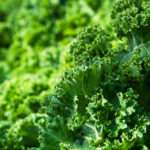 The latest findings from the Adventist Health Study-2 (AHS-2) found that people who ate plant-based diets—which included vegans, lacto-ovo vegetarians and pesco-vegetarians—had a 22% lower risk of colorectal cancer (1).
The latest findings from the Adventist Health Study-2 (AHS-2) found that people who ate plant-based diets—which included vegans, lacto-ovo vegetarians and pesco-vegetarians—had a 22% lower risk of colorectal cancer (1).
But when the researchers pulled the subjects apart into more specific groups, the only group of “vegetarians” with a lower risk were the ones who ate fish. Their risk was 43% lower than the omnivores in this study. While vegans and lacto-ovo vegetarians also had a lower risk for colon cancer, these findings weren’t statistically significant.
The only other large scale study to look at colon cancer in vegetarians is the EPIC-Oxford Study in England and this research found no protection from a vegetarian diet (2).
So what exactly are we to make of these findings? First, I’m not especially inclined to get too excited about them one way or the other. It’s just one study, after all, and no single study is the end all and be all of evidence. But I’m not prepared to dismiss them either. If there is anything within these findings that might help us make vegan diets healthier and more protective, then we should pay attention to them.
Admittedly, though, the evidence regarding diet and colon cancer is not exactly crystal clear. There is certainly good support for the idea that red and processed meats raise colon cancer risk and fiber lowers it. That’s good news for vegans since we have those things well-covered.
We may not have calcium covered, though. Dairy foods and higher calcium intakes have been associated with lower colon cancer in some studies (3,4). In the AHS-2 study, differences in dietary calcium intake among the groups weren’t huge but pesco-vegetarians consumed on average about 100 mg more per day. They were also more likely to use calcium supplements. (I’m not sure if those amounts were included in their dietary intake, but calcium supplements may be as protective as calcium from food, or possibly more so (3)).
Vitamin D may also lower colon cancer risk (5). Although the pesco-vegetarians were less likely to take vitamin D supplements, they may have had higher vitamin D intake depending on the type and quantity of fish they were eating. (It’s pretty difficult to meet vitamin D needs from fish alone, though).
The pesco-vegetarians most certainly had higher intakes of long-chain omega-3 fats, but it’s not at all clear that this is protective (6).
But even if all three of these factors—calcium, vitamin D and omega-3s—lower risk for colon cancer, it’s easy enough to include them in vegan diets:
• Eat plenty of calcium-rich foods (especially leafy greens, which have their own cancer-fighting compounds, none of which are found in cow’s milk).
• If you don’t get adequate sun exposure, take a daily supplement of vitamin D (most omnivores need to do this, too).
• Consider a supplement of long chain omega-3 fats DHA and EPA from microalgae.
And remember to exercise—a habit that is linked to lower colon cancer risk. And don’t drink too much alcohol.
Again, we don’t know that all or any of these things will lower your risk for colon cancer. But they are good diet and health practices anyway, so you have nothing to lose.
(For more information about the AHS-2 findings on colon cancer, see Jack’s post.)

‘• Eat plenty of calcium-rich foods (especially leafy greens, which have their own cancer-fighting compounds, none of which are found in cow’s milk).’
Does the calcium in leafy greens has cancer-fighting compounds, or ‘just’ the leafy greens? (I.e. is it a better sort of calcium or a better sort of vehicle for calcium?)
As always, thanks so much for your honest and thorough take on these issues, Ginny.
A few things.
1- You recommend taking Omega 3 supplementation, as a vegan diet is very poor in DHA and EPA. If you care about nutrition, as a dietitian your first recommendation should be to eat fish and thus, not be vegan in the first place. Finding nutrition and yet promoting the most restrictive diet on the planet doesn’t go hand and hand.
2- The Adventist study doesn’t compare mortality of a healthy omnivore diet which doesn’t include processed foods, trans fat, vegetable oils, refined sugars etc etc to a vegan diet.
3- Its much easier to drink milk than eat the equivalent calicum in any green. You’re using proportion distortion. Actually, if you’re not lactose intolerant both can be part of a healthy diet(not mentioned).
4-Exercising and avoiding alcohol is not a copyright of veganism. Omnivores do it too.